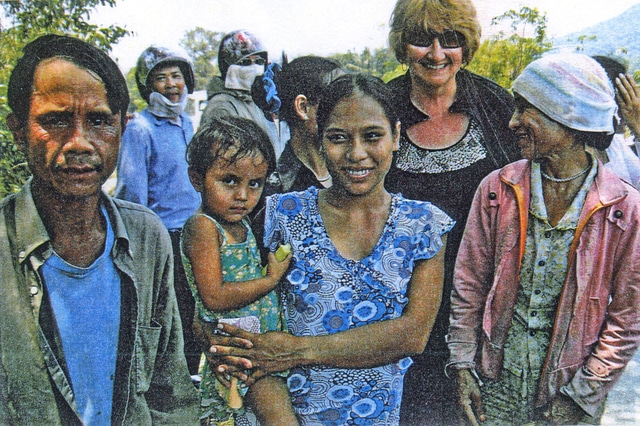
Midge Rose was the guest speaker for the April meeting of the Hillsboro Woman’s Club and she fascinated her audience with stories of her trip as a missionary to Vietnam in April 2010. She explained that since VIetnam is just 11 degrees from the Equator, it is always hot, even at night. Most places are not air-conditioned and even her hotel was only air-conditioned at night, because of the cost.
The trip, organized by the Shawnee Valley District of the United Methodist Church, arrived at the airport in Ho Chi Minh City on Thursday, April 8. The group was there to deliver 24 motorcycles to Methodist churches. Bikes are the most practical means of transportation in the jungle-like country. The Communists, who control much of Vietnam, tried to prevent the group from delivering the bikes. But the tourists found an alternative route and managed to complete its mission. The country’s first UME church was dedicated while they were there.
Most commerce takes place in Central and South Vietnam, where there are also beautiful beaches. The movie “China Beach” was filmed in the central area. Oddly enough, the women rule the homes in this dreadfully poor country. Many live in what they call “tube” houses, which are above-ground and are 6.5 feet wide by 250 feet long. They use the front section for their businesses, with work space in the middle, and the families live in the back area and sleep in hammocks. There are also grass huts which are built on stilts and shared by several families, most of whom are either Catholic or Buddhist. Those who make their homes in boats grow crops along the banks to provide income. Visitors see laundry hanging everywhere, from balconies and shrubbery to boats and docks.
The dead are buried above ground because of standing water and roaming animals/predators. Some 50 percent of the residents were living in poverty in 1993, but that number improved to 20 percent by 2005. Most families survive by selling crops or handiwork they make. Planting and harvesting of rice is all done by hand, and the children work alongside their parents, despite the hot, humid temperatures. Any schooling they get is through groups who meet in their homes. Tourism is now one of their main enterprises.
The speaker said water from the rivers is used for drinking, cooking, bathing and clothes washing, as well as for the elimination of body wastes. Rose said that when she first returned from this trip, she cried every time she turned on a faucet and thanked God for the privilege of having pure water. As the ruling Communists became more and more strict, many people tried to leave the country, and many were captured and tortured. Children born crippled or maimed are abandoned in the streets. Rose met a young Vietnamese lawyer who found a little 9-year-old girl who was trying to survive that way. He left his job to start a church and assist them in earning a living through art, crafts, sewing and the making of unique wooden items.
The Vietnam War killed more than three million people, including 58,000 Americans. Approximately 11,000 military women were stationed there. Ninety percent served as nurses, although women also worked as physicians, air traffic controllers, intelligence officers, clerks and other positions in the U.S. Women’s Army Corps, U.S. Navy, U.S. Air Force, U.S. Marines, Red Cross, USO Catholic Relief Services, and as foreign correspondents.
In November 1993, the Vietnam Women’s Memorial was dedicated at the Vietnam Memorial in Washington, D.C. before a group of some 25,000 people. Women’s presence in the war begin in 1964 and reached its peak in 1970.
In April 1975, Communist forces seized control of Saigon (the former capital) and renamed it Ho Chi Minh City in honor of the man who had served as North Vietnam’s president for 25 years. Ho Chi Minh was also a symbol of Vietnam’s struggle for unification against the strongly anti-Communist regime in South Vietnam and its powerful ally, the United States.
Despite their being under Chinese rule for 1,000 years, they still maintain the three most important tenets of their culture:
• They highly respect their elders.
• They value education highly.
• They believe that women should rule the households.
However, the effects of Chinese rule for some 1,000 years is still reflected in their customs, traditions, beliefs and architecture, said Rose as she closed to rousing applause.
A brief business meeting was conducted by president Mary Todd Hardeman, who opened with an Irish blessing: “May your neighbors respect you, trouble neglect you, the angels protect you and Heaven accept you.” This was taken from “Paul Revere’s Ride” by Henry Wadsworth Longfellow.
One guest was welcomed, officers’ reports were accepted, and it was unanimously accepted to help sponsor the After Prom party held at Hillsboro Elementary. The name of a prospective member was submitted and signed by Jean Wallis, Maxine Kratzer, Frieda Redkey, Pauline Cameron and Anne Lerch. It will be voted upon at the next meeting. Virginia Purdy was named to chair a committee to review the club’s bylaws and constitution and report at the next meeting, which will be held at the senior center. The president also thanked the caterer, Mike Allering of All Seasons Catering, for the excellent luncheon he provided.
Submitted by Gretchen Huffman, Hillsboro Women’s Club secretary.


